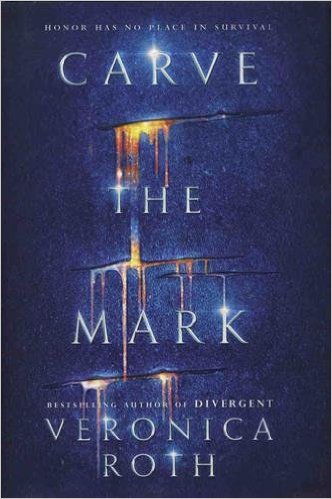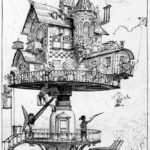Tolerance And Stories? A Discussion Of Carve The Mark
How does the emphasis on tolerance affect our stories?
As I see it, the push for tolerance has spawned an overly sensitive culture that now finds offense in . . . pretty much everything. And it’s affecting the publishing industry. I recently learned that publishers have begun to hire “sensitivity readers” to check out potential manuscripts to see if there’s any “offensive” content.
Of course, that begs the question: offensive to whom?
What one person assumes or ignores or believes in, another person finds offensive.
The latest Veronica Roth novel, Carve The Mark, is an example of a book receiving negative reviews because of its perceived offense. One such review is entitled “Why You Shouldn’t Read CARVE THE MARK.” In short,
Carve the Mark has been called out for being racist and problematic by various readers who are much more informed than I am and feel directly affected, offended or hurt by what is written in Carve the Mark. While I’m white and I’m obviously not in the position to declare what’s racist and what isn’t, I’m a strong believer in calling out problematic representation and racism and I believe that we should all be reading more diverse books.
As it happens, none of the made up races were directly identified with any actual races, but early readers deduced that the group of people with evil intent was similar to people in North Africa. In contrast, the heroic group is “coded” as white.
One early reader listed these coded racist elements in Carve The Mark:
· The Shotet language is described as harsh, with sudden stops and closed vowels, unlike the beautiful, open vowel sounds of the Thuve
· The Shotet carve marks into their arms when they kill someone, meaning that both men and women have many scars, and this practice is seen as barbaric by the loving and peaceful Thuve
· The female main character, Cyra, describes her mother’s kinky hair as curly enough to trap fingers, while her curls are looser and allow fingers to flow through. The Thuve have straight hair.
· The Shotet have no home planet, rather they travel around the universe in pursuit of the current, a unifying life force that allows people to have gifts (all of which seem to manifest in violent ways in the Shotet, and it is even stated by a doctor that the reason Cyra’s gift causes her pain is because of her people’s tendency to violence)
· The Shotet ruling family is one that embraces violence, so much so that the matriarch is famous for having killed her brothers and sisters, contrasted against the scene of Thuve familial love that opens the story. This is further reinforced by the cruel treatment Cyra receives from her brother
· The Shotet kidnap Akos and his brother, who are Thuve, and force them into a life of what can most easily be described as brutal slavery.
If racism isn’t a great enough charge, Carve The Mark has also been criticized because one of the characters has received “the gift of chronic pain.” That apparently is an example of an already rich and famous author exploiting those with a disability.
Then there’s the issue of cutting which some thought was being thrown into a dangerous light because the race of violent people “marked” themselves as “a means to record a number of kills” (Review). While criticizing this use of cutting as antithetical to the African society which the fictitious people supposedly mirror, the same review then criticizes the cutting aspect as selling “something many will construe as self-harm as glorious and noble.” (Ibid).
In other words, the same reviewer found fault in the fictitious practice because it put a certain African culture that also used cutting in a bad light while simultaneously selling cutting as something glorious and noble.
Understand, I have not read Carve The Mark, so I might find the book problematic too. But I have to wonder if perhaps our society hasn’t become too caught up in what we find offensive. The odd thing is the “we” comes with limitations. What we’re offended about has to fall into the acceptable categories. For example, I’m mildly offended for my Hispanic neighbors because Hispanics are woefully underrepresented in the media. Nobody else seems to even notice.
 But more underrepresented are evangelical Christians. There have been and are some TV programs that feature openly Catholic characters (e.g., Father Dowling Mysteries from some time ago and Blue Bloods more recently.) But characters that hold an evangelical perspective, who pray, read their Bible, go to church, believe in Christ as their Savior . . . these characters have been set aside. Once a surprising number of shows had at least the external trappings of the life of a Christian, but no more.
But more underrepresented are evangelical Christians. There have been and are some TV programs that feature openly Catholic characters (e.g., Father Dowling Mysteries from some time ago and Blue Bloods more recently.) But characters that hold an evangelical perspective, who pray, read their Bible, go to church, believe in Christ as their Savior . . . these characters have been set aside. Once a surprising number of shows had at least the external trappings of the life of a Christian, but no more.
All that to say, Christianity may have become too controversial for the media in general and publishing in particular. Would sensitivity readers ever allow a Christian worldview to permeate a story without flagging it as offensive?
Which brings up the issue: what are Christians to write? What are Christians to read? If general fiction is to be whitewashed of anything that could possibly be considered offensive, what kind of stories will that leave us?
Who will be the victims and who the heroes of our stories going forward. Will white men be cast in the role of villain from now on? (See Avatar.) Or will we be so worried about offending someone that we simply do away with conflict all together and write only about coming of age and learning to look within ourselves to become better people?
Or are science fiction and fantasy able to transcend the problem and continue to tell good stories—as long as we do our homework and make our worlds so other that no one can assume we are coding people groups to fit races on earth. (Or that we aren’t encouraging cutting, or denigrating people groups who once cut, or exploiting people with disabilities or . . .)
Your thoughts?









































This boggles my mind, because what’s described in the thick of all the gnat-straining is a pretty interesting story. African tribes would horrifically scar themselves and put bones in their noses and stuff so they’d be too ugly for the slavers to take. Eventually it became a tribal fashion statement. But that kind of thing is historical and true. People carving marks on themselves for how many people they’ve killed? Not much different. Did any of these virtuous culture-judges ever stop to notice that this is FICTION?
Oh heavens. I don’t think this sort of thing is even worth discussing, except to laugh at. SJWS (or facists, as they used to be called) hate to be laughed at. It’s the worst thing we can do to them, aside from ignoring them.
Kessie, the problem is that the publishers are totally into this, with the sensitivity readers and all. I think they would have no problem rejecting a book because they thought the content was somehow out of bounds. (Sort of like censoring book before they get in print.) I can’t imagine a book published with a character who is prolife, for instance. Too hateful of feminists, I imagine the thinking would go.
This is the way our culture is going: haters, every one of us. And if you didn’t know you were a hater, they’ll be happy to tell you so.
The crazy thing is, Carve The Mark has a theme line about breaking stereotypical gender lines. You’d think the book would be applauded in this culture, not vilified.
#NobodySafe
Becky
I don’t know anything about this book, so I can’t comment on it in particular, but it does bring up some topics on how to write villains and how not to offend people. Racism is wrong, and it would be bad if an author truly singled out a race and wrote it as if they were trying to say that race was evil in real life. But sometimes I wonder if people who complain when a white character is depicted as good and a minority character is depicted as a villain have a double standard. I rarely, if ever, see anyone complain if a story acts like all the minority characters are good and all the white ones are bad. If we truly wanted to end racism, then wouldn’t we realize that both whites and non white have equal potential to do wrong?
One way I tackle this is to show variety in each culture. Even if the main villains in a story are from a certain group, I try to show other individuals from that culture who are good. I also have groups and cultures go through cycles when I can. I may, for instance, have a culture start off as relatively good, turn bad because of a catastrophic event or manipulation by a villain, and then eventually find redemption and turn good again. Somewhat like what Germany went through before, during, and after the Nazis.
Autumn, you are thinking along the lines I was. How can we show villains without somehow offending someone who thinks we’re perpetuating white power over other races? I mean, when I read in one of the articles that Tolkien’s orcs were part of the racial stereotyping of minorities, I about lost it. Orcs were not anything like any human race. They were creations of the author’s imagination and nothing else that I’ve ever heard before. This is why I think people who want to think you are racist will find something racist in all of us.
The other thing that struck me was the blogger who said she couldn’t speak to racism because she’s white. Hmmm. That sounds . . . suspect, at best.
I think there’s a lot to say for your approach, Autumn.
Becky
I saw this with another book, Inhuman by Kat Falls. Some people took issue with on quote in the first few chapters and gave the book bad reviews, then liked each other’s bad reviews on goodreads, thereby stacking the deck. Since the author isn’t nearly as popular, it didn’t make waves in the publishing community, but I’m guessing it hurt her sales.
Here’s a story about an author who got in trouble for having something perceived as anti-abortion. http://www.nickcolebooks.com/2016/02/09/banned-by-the-publisher/
I find it interesting that these people preach tolerance, but they are intolerant of everyone who disagrees with them, which makes them much worse than the people they attack.
It seems to me that authors should be given the benefit of the doubt, especially in cases where they obviously weren’t trying to do something controversial.
Jessi, thanks SOOOO much for that link. What happened to Nick Cole is precisely what I’m talking about. But I didn’t realize it had affected a writer under contract to this extreme! I particularly like this line in his article” “But apparently advancing the thought that a brand new life form might see us, humanity, as dangerous because we terminate our young, apparently… that’s a ThoughtCrime most heinous over at Harper Collins. Even for one tiny little chapter.”
Yes, now the publishers get to decide what’s offensive and what’s not.
Here’s another line I thought most salient: “Writers are often the last flame of freedom on the flickering candle of civilization in the darkness of a world going mad.” Pretty dramatic, but he’s right—now that we are no longer beholden to traditional publishers. Indie publishing allows authors freedom we’ve never experience before. But of course, we’re also small fish trying to be noticed against the backdrop of the great ocean seeded with big fish of the publishers own choosing.
I agree with your conclusion, Jessi. I think writers should have the freedom to create the stories of their own choosing. That’s what we’ve allowed for generations. But now that the “rebel writers” want to put in ideas that clash with the positions of the editors in charge, now we’re removing books from the publishing schedule because we disagree with one of the ideas set forth in it.
I think we’re moving toward those societies that created dystopian rebellion.
Becky
Sometimes these controversies remind me of the section in “The Great Divorce,” where McDonald explains the difference between the pity that drives people to help others, and the pity that people use to manipulate others into doing what they want. All too often, the constantly offended groups seem to fall into the second category, especially when they actually start to control what’s published. And I don’t think any writer has an obligation to cater to the perpetually offended. People who go out looking out looking for something to be offended by, will find it.
Agreed! I’m just glad that we have options in this day and age. For instance the author in the article Jessi linked to just self-published his book. Some of the reviews on Amazon said the reader initially picked up the book BECAUSE of the controversy and the publisher ban. That could not have happened even 20 years ago.
Becky
I don’t talk about it that often- But I once submitted a short story to a pretty prominent short story publisher. I got rejected but what boggles my mind was the reasoning for the rejection… They were looking for diverse stories- I have no problem with diversity in stories by any means- But as I read the rejection email they went on to explain that they wanted stories where LGBTQ and other characters were excelled and placed in Main Character rolls- Agaian I don’t have a problem with these characters- (someone wants to write a gay character write a gay character- Icould care less) but my issue was I was being rejected based not off the story being good, being well written, etc- I was rejected simply because I was not a diverse / sensitive enough writer. I laughed it off and just moved on- I get publishers have their “own” platforms and if something doesn’t work for their audience they have the right to reject it- still, made me think, if One (a debuts author that is) was to crossover from the CBA to the general market (in the Sci Fi / fantasy community) would they be accepted or utterly ridiculed…?
If one was to crossover from the CBA to the general market (in the Sci Fi / fantasy community) would they be accepted or utterly ridiculed…? That’s the question, isn’t it, JJ. So people who aren’t perceived to be “diverse enough” are not represented by that publisher. How diverse are they if they don’t have room for stories that don’t comply with their particular standards? Yes, they have the right to set those standards, but they should not also be viewed, or promoted themselves, as tolerant and all inclusive. They are neither, and we who have a different worldview need to understand this about general market publishing.
Becky
Great post, superb comments. I agree with all of you. I may be proved 100% wrong, but I do not think this trend will last, not if they want to sell books and make a profit. Some of this is the intolerant Left digging their claws in where they still can, in reaction to and resistance against what happened this past November. The Left was thoroughly rejected by the majority of voting Americans, regardless of how one feels about who won. As a result, the Left is doing every single thing it can to hit back where they still hold sway — in the media, on campus, and in publishing, which is of course a form of media. What’s a Bible-believing Christian to do? Be faithful. Endure hardship. Trust Jesus. And press on. YHWH rules, not the media, or the Left — or the Right either. Let’s have and keep some perspective here, brethren. Pray for open doors. We may all be surprised at what God may yet do through us!
These are all great comments, and I agree with you, HG — trust Jesus. And press on. I recently watched a webinar about Contemporary Romance — not Spec, obviously, but another popular genre. And CLEAN Contemporary Romance is growing exponentially as a popular sales category on Amazon. I think the general population is tired of the slippery slope we’ve been on for the past 8 years or so, maybe more, and they want something different. Writers of faith, persevere. God rules, He reigns, He sets our feet on high places.